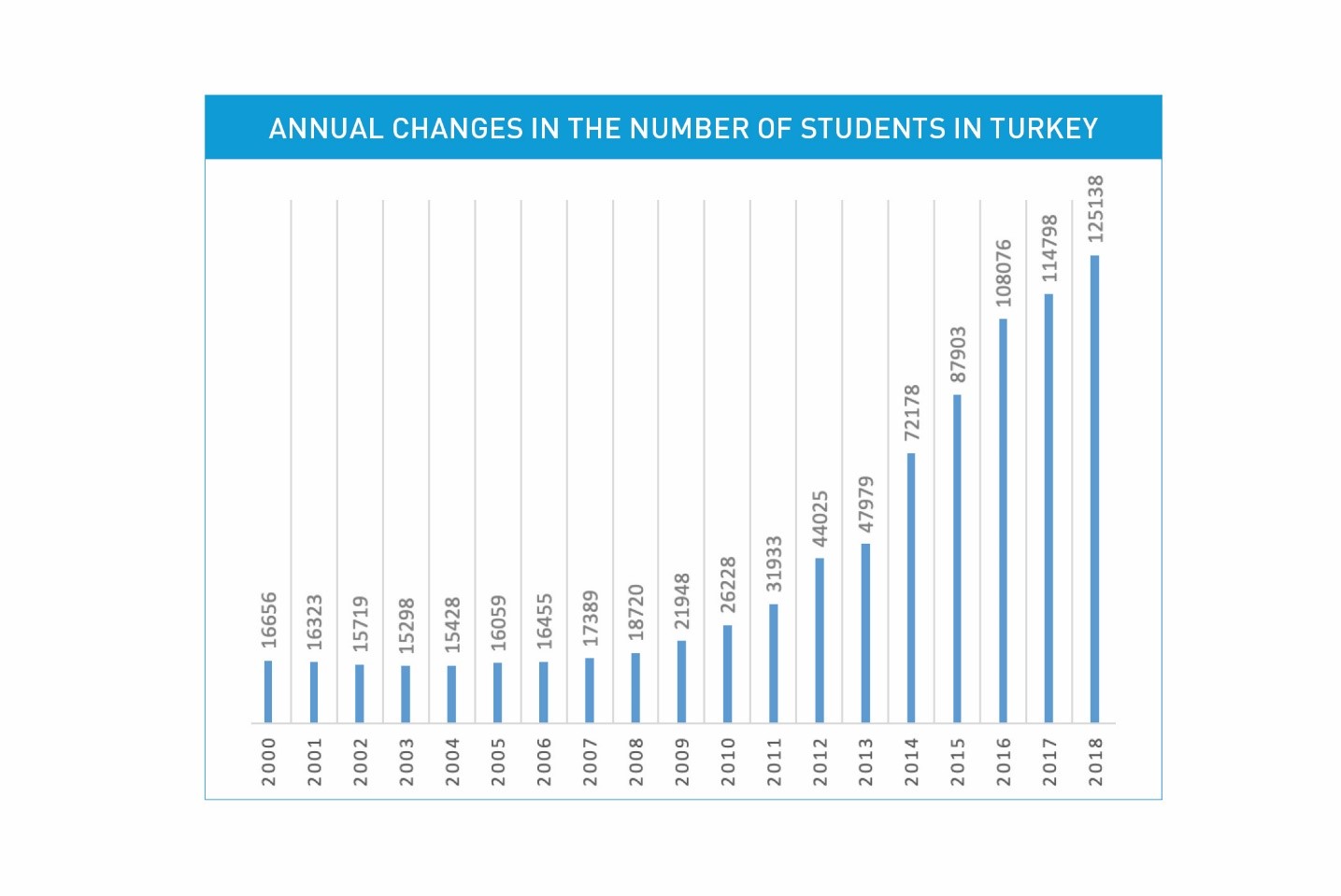Today, international student mobility across the world is closely related to the parameters of economic development, cultural interaction, production, and the transfer of information and public diplomacy. Many countries have been developing national policies in the context of political-cultural interaction and economic return. Developed countries are coordinating their planning policies for scholarship and self-funded students, and consider international students as a major instrument of public diplomacy.
Turkey has also recently began to show growing interest in the subject of international students. Turkey’s endeavors and support in this regard have concurred with the strained global political context due to the Trump effect, Brexit, and the rise of the far-right in Europe. Current political uncertainties and the rise in anti-immigrant discourses, particularly in the West, spur international students to look for new alternatives. The present conjuncture also affects the choices of international students to a great extent and presents Turkey significant opportunities to become the center of attraction for international students.
Current political uncertainties and the rise in anti-immigrant discourses, particularly in the West, spur international students to look for new alternatives.
When viewed from a broader perspective, it can be seen that international student mobility is open to larger masses now, which means that those who were unable to access international higher education in the past can now take part in this mobility. Among countries gaining or aspiring to gain economic strength, there is a rapidly growing demand in studying abroad. This mobility is obvious especially in countries such as China, India, and South Korea.
In countries that are prominent in the competition for drawing international students, the importance of the subject has been well known for a while and long-term strategic policies regarding this matter have been developed. It is believed that international students create added value in the countries they study in, including areas in academia and science, economic development, and the creation of a multi-cultural environment. More specifically, international students make great contributions in terms of skilled workforce, institutional improvement, inter-societal understanding, and diplomatic prestige.
Efforts exerted on international students also present the background and values of the host country to other societies. Therefore, multifaceted activities are carried out in the field of public diplomacy with the participation of state institutions and organizations, the private sector, and non-governmental organizations.
International student mobility is open to larger masses now, which means that those who were unable to access international higher education in the past can now take part in this mobility.
According to data presented by UNESCO, countries such as China, India, Germany, and South Korea are the biggest sources of international students. Looking at the topic generally, 52 percent of international students come from Asia, 25 percent from Europe, 8 percent from Africa, and 5 percent from Latin America. Currently, around 5 million students are studying outside of their home countries and this number is expected to exceed 8 million in a few years. Judging from the benefits that international students bring, it is likely that competition in this field will increase.
Specifically considering the economic dimension of the subject, the export of educational services is estimated to be a 60 to 100 billion dollar industry worldwide. As can be seen from the table presented below, in the U.S., which is home to 20% of international students, exporting educational services has contributed 39.4 billion dollars to the economy in 2016, and for Australia, educational services have contributed 28 billion Austrian dollars (roughly 20 billion U.S. dollars), as an export item. Including services such as consultation, travel, housing, guest expenditures etc., along with educational services, it can clearly be seen that this is a considerably important economic sector.
Recommended

The education spending of international students has made international higher education the 3rd biggest export item in Australia. The contributions of immigrants and especially international students to innovation in the U.S. can also be seen to be at a non-negligible level if judged from the number of patents registered. Again, Canada has introduced regulations to its migration policy that make it possible for international students to stay after graduation, increasing their academic and economic contributions to the country.
International education projects in Turkey
Although Turkey is a country that has considerable experience in the field of international education, it can be seen that globally competitive and systematic policies and policies have only recently been implemented. Turkey receives international students mostly via scholarships and it can be observed that since the 1950s there has been an increase in scholarship opportunities for international students in Turkey via international agreements. The “Grand Student Project,” which began in 1992 is an example pf a systematic program that made it possible for many students, especially from Turkic countries, to study in Turkish universities via scholarships.
Since the 2000s, many important steps have been taken in the field of international education in Turkey. A couple of these are: The Turkish Council of Higher Education’s (CoHE) decision to allow flexibility in the admission and fee policies for international students in 2010, the decision of the Ministry of Economy in 2012 to provide incentives for universities participating in international education expos, the inclusion of international education projects in the 10th development plan in 2013, and in the same year, the launch of the Study in Turkey portal, along with the implementation of new regulations regarding visa and residency permits, health insurance, and work permits.
Currently, over 7 million students are receiving education in Turkish universities. Around 1.6 percent of them are international students (more specifically, the number of total students in higher education in Turkey is 7,560,371 and 125,138 of them are international students). Among OECD countries, this ratio is on average 6 percent. Needless to say, there are significant differences between countries. For example, while in the U.K. this ratio is 21 percent and in Australia 20 percent, in Germany it stands at 8 percent and in the U.S. around 5 percent.
Currently, over 7 million students are receiving education in Turkish universities. Around 1.6 percent of them are international students (more specifically, the number of total students in higher education in Turkey is 7,560,371 and 125,138 of them are international students).
With statistics provided by the CoHE, the graph below depicts the annual changes in the number of international students in Turkey.
 Turkey’s goal for the number of international students in Turkey for 2022 is 200,000. This number is actually well below Turkey’s potential. In the Global Trends in International Student Recruitment Report published in 2017, according to a narrow study conducted among 1,623 students, Turkey ranked 11th among the first 25 countries in international student preference. This is important as it reflects the fact that policies pursued by the government are on the track of achieving their objectives, and if these policies are maintained or accelerated in this direction, Turkey really does have the potential to become the hub of international students in the near future.
Turkey’s goal for the number of international students in Turkey for 2022 is 200,000. This number is actually well below Turkey’s potential. In the Global Trends in International Student Recruitment Report published in 2017, according to a narrow study conducted among 1,623 students, Turkey ranked 11th among the first 25 countries in international student preference. This is important as it reflects the fact that policies pursued by the government are on the track of achieving their objectives, and if these policies are maintained or accelerated in this direction, Turkey really does have the potential to become the hub of international students in the near future.





